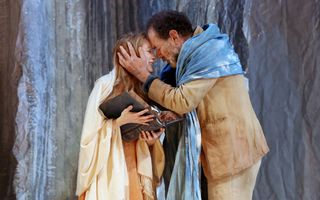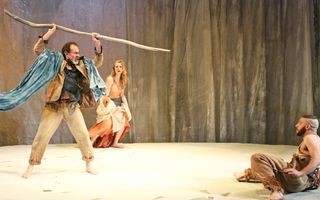 Watch
Watch
Revenge and Forgiveness
Relinquishing revenge in favour of forgiveness would have been an appropriately moral story at the time The Tempest was first performed. Themes of reconciliation and forgiveness do appear more frequently in Shakespeare’s later romances, and they seem to present a faith in future generations. Scholars suggest this sentiment comes from a more knowing and more reflective Shakespeare as he approached retirement.
Yet many have questioned whether Prospero actually learns anything from his journey, or whether Shakespeare effectively realises this forgiveness. The change in Prospero from planning everything to serve his revenge, to deciding not to punish any of his enemies, is the key emotional journey of the play, the calming of his own ‘tempest’. However, for a lot of the action Prospero is wholly focused on tormenting his enemies. It is only the non-human Ariel who acknowledges that Gonzalo, who helped Prospero and Miranda, is suffering and so begs Prospero to relent: "The good old lord, Gonzalo his tears run down his beard… if you now beheld them your affections would become tender" (Act 5, Scene 1).
Prospero’s epiphany only comes in the final act when he concludes: “The rarer action is in virtue than in vengeance.” (Act 5, Scene 1) And yet, Shakespeare never makes a resolution too simple: Antonio and Sebastian, for example, show no contrition. It is uncertain what is now going to happen to Caliban, and whether the provinces of Milan and Naples will be joined as one kingdom under Ferdinand and Miranda’s rule. This is an idea that seems abhorrent to Prospero when he speaks of how Antonio would “bend / The dukedom yet unbow’d – alas, poor Milan! / To most ignoble stooping” (Act 1, Scene 2).
So, is the ending happy and reconciled, or bitter and divided? A close look at Act 5, Scene 1 reveals many moments of joy, forgiveness and reconciliation, but other moments suggest recrimination, bitterness or problems still to come. The play’s final moments set up a fine opportunity to debate where the balance lies.
Man and the Monster
Shakespeare presents Prospero as the educated, enlightened, civilised man who conquers the uncivilised of the island. He offers the Indigenous people and spirits refuge and freedom from the tyrannous reign of the witch Sycorax’s black magic, and at some point even affection: “When thou cam'st first, / Thou strok'st me, and made much of me... And then I loved thee'. (Act 1, Scene 2)
However, it is important to note that Shakespeare doesn’t offer this as a simple dichotomy of civilised versus savage. No matter how educated they are, Prospero and the nobles are deeply flawed and cruel. When faced with death in the shipwreck, Antonio’s language is reduced to curses: “Hang, cur! Hang, you whoreson, insolent noisemaker!” (Act 1, Scene 1). When faced with the uncertainty of the island, Antonio and Sebastian are very quick to dispel all honour and civility and plot against their companions. Prospero promises to free Ariel but continues to dishonour his word and although he claims to have treated Caliban with “human care” (Act 1, Scene 2), he actually took his land, enslaved him, worked him harshly and addresses him as “poisonous”, and “abhorred” (Act 1, Scene 2). Prospero justifies his actions, accusing Caliban of attacking his daughter in a base and vile act, yet this moment is ambiguous.
Shakespeare presents Caliban as the equivocal ‘other’, unlike a character we have met before. He is neither ‘monster’ (as he is so often called in Act 2) nor the ‘noble savage’, which invites the audience to question the line between the civil and the uncivilised. Caliban is continuously described with animal imagery, which is concurrent with the beliefs of European colonisers, who saw native people as fauna and used them for slavery. However, unlike any other character, Caliban displays a rich, eloquent and affectionate appreciation for his land and he expresses this in an advanced and perceptive use of poetry: “Be not afeard; the isle is full of noises,/ Sounds and sweet airs, that give delight and hurt not.” (Act 3, Scene 2) Caliban only truly behaves in an immoral manner in response to Prospero’s tyranny and when offered alcohol by a European man. It could be said that all male characters in The Tempest present qualities of both man and monster, despite their backgrounds.
Nature versus Civilisation
The Tempest continually engages in the Renaissance debate over whether man is nobler in his natural state or in the confines of civilisation. Shakespeare throws men that have only known the realms of the court onto an unpredictable and unruly island in which they are faced with creatures that contradict their very notion of what man should be. Prospero and Miranda contend that they attempted to civilise Caliban, but the strength of his evil nature could not be suppressed. However, Caliban’s speeches in which he describes the wonders of the island are not clumsy or rough, but beautiful poetry. Do we assume that he was capable of learning, or that civilisation fails to see the more inherent natural virtues he has, that may not fit with its preconceptions? As soon as any human, from Prospero to Gonzalo to Stephano, arrives in this natural place, they immediately try to replicate the hierarchical power structures from which they came.
However, some of these men, including Prospero, who were corrupt and flawed in civilisation, seem to find humanity in nature. As the academic Northrop Frye states, this island “is a place where people find themselves and lose some of their flaws”. Gonzalo debates with the other nobles about the utopian qualities of the island, which he deems superior to corrupt civilisation. He lays out a vision of what it would be like to live in such a paradise:
I' the commonwealth I would by contraries
Execute all things; for no kind of traffic
Would I admit; no name of magistrate;
Letters should not be known; riches, poverty,
And use of service, none; contract, succession,
Bourn, bound of land, tilth, vineyard, none;
No use of metal, corn, or wine, or oil;
No occupation; all men idle, all;
And women too, but innocent and pure;
No sovereignty;--
All things in common nature should produce
Without sweat or endeavour: treason, felony,
Sword, pike, knife, gun, or need of any engine,
Would I not have; but nature should bring forth,
Of its own kind, all foison, all abundance,
To feed my innocent people.
Act 2, Scene 1
Much like Duke Senior in As You Like It, Gonzalo longs for the natural life, away from the intrigues and envy of the court. However, in The Tempest, the word ‘natural’ itself is ambiguous. Miranda uses it to distinguish the “divine” and “noble” Ferdinand from the “natural” creatures she is used to (Act 1, Scene 2). Trinculo exclaims (of Caliban) “That a monster should be such a natural” (Act 3, Scene 2), using ‘natural’ in its early-modern sense of ‘idiot’. Later Prospero calls his brother “unnatural” because of his treacherous nature (Act 5, Scene 1).
The play seems to question whether or not man can be at one with nature: does man make everything he touches unnatural or will nature always dominate him? When Ariel surrounds and torments the weary nobles in Act 3, Scene 3 he reveals how the island has disempowered them and made them “mad”:
On this island
Where man doth not inhabit, you ’mongst men
Being most unfit to live. I have made you mad,
And even with suchlike valor men hang and drown
Their proper selves.
Act 3, Scene 3
Their status and formalities have no currency here and, as Ariel states, they may as well stab their swords into the “loud winds” (Act 3, Scene 3). The island has exposed them as “Three men of sin” (Act 3, Scene 3): no henchmen, or no courtly rank or finery can help them now. They must, from this time forward, live innocent lives. Yet in The Tempest, as in many of Shakespeare’s comedies, humans learn in nature, but then return to the city, thus restoring all social structures.
Freedom and Confinement
n The Tempest, Shakespeare constantly makes reference to whether or not someone is captive, subservient or free. Caliban and Ariel may be the most obvious examples, but all the survivors of the ship at some point have their movements confined by Prospero. However, Prospero’s final words are to ask the audience to set him free by giving the play their blessing. He himself is imprisoned on the island. Sycorax was banished there as a punishment, and she imprisoned Ariel in a “cloven pine” until Prospero released him. Even Stephano and Trinculo attempt to become masters in order to overcome being servants. For Caliban, freedom is so distant an idea that his ambition only extends to finding a different master. The privileged Ferdinand, on the other hand, welcomes servitude as an opportunity to demonstrate his devotion:
Might I but through my prison once a day
Behold this maid: all corners else o’ the earth
Let liberty make use of; space enough
Have I in such a prison.
Act 3, Scene 1
Nearly every scene in this play presents a relationship in which one party possesses power over another. In doing so, Shakespeare explores and challenges power structures in varying forms: king/subjects, usurper/usurped, father/daughter, master/servant, clown/native, learned/monster, wizard/captive sprite.
In many cases the suppressed make certain discoveries about their oppressor and act out in rebellion. The Boatswain and Master are very quick to withdraw their respect for royalty when their lives are at stake. When asked to remember the importance of those on board the Boatswain defiantly responds by saying there is “None that I more love than myself” (Act 1, Scene 1). Despite Ariel’s powers, Prospero openly addresses him as a servant, “Come away, servant, come. I am ready now” (Act 1, Scene 2). Ariel continually wishes for freedom, as he has gone from one master to the next: ‘Thou, my slave, / As thou report'st thyself, was then her servant' (Act 1, Scene 2). When Prospero informs Ariel that there is ”more toil” to be done (Act 1, Scene 2) he answers back confidently, reminding Prospero that he has done his office:
Remember I have done thee worthy service;
Told thee no lies, made thee no mistakings, served
Without or grudge or grumblings: thou didst promise
To bate me a full year.
Act 1, Scene 2
Prospero may show Ariel some kindnesses and appreciation: “My brave spirit!” (Act 1, Scene 2), but as soon as Ariel defies him he rains down curses and threats: “Thou liest, malignant thing!” (Act 1, Scene 2) However, Prospero does eventually grant Ariel his freedom in the final scene of the play: “My Ariel, chick, that is thy charge: then to the elements be free” (Act 5, Scene 1). This coincides with Prospero’s own personal discovery in which he lets go of his magic, releases his resentment, and forgives his usurpers.
Unlike Prospero, who undergoes some shift in his understanding of power, Antonio doesn’t seem to change. He boasts of easily winning Milan by foul means and suggests to Sebastian that he can do the same with Naples. He is blindly confident that they can kill King Alonso and fool the other men to follow their cause: “For all the rest they'll take suggestion as a cat laps milk; / They'll tell the clock to any business that we say befits the hour” (Act 2, Scene 1). Prospero then overpowers Antonio, instils fear in him with the banquet, and reclaims his dukedom. Prosepero does forgive him, but it comes with a sharp rebuke:
For you, most wicked sir, whom to call brother
Would even infect my mouth, I do forgive
Thy rankest fault; all of them; and require
My dukedom of thee, which perforce, I know,
Thou must restore.
Act 5, Scene 1
All ‘masters’ in The Tempest misuse power in some manner, whether through acts of cruelty or negligence. Trinculo and Stephano mistreat and misguide their new subject Caliban and call him a “A most scurvy monster” (Act 2, Scene 2). Prospero first neglects his dukedom, then when he takes power on the island, he enslaves his only new friends. Alonso and Antonio send Prospero and baby Miranda to their possible deaths in a leaky boat, and Sebastian considers killing his own brother in order to take the crown. However, characters do make discoveries through their own misuse of power. Alonso regrets his ill-treatment of Prospero by experiencing his own fear of losing his son, and Antonio is silenced in the final scene when he realises Prospero has outsmarted him.
Women in the Tempest
Women in The Tempest are quite clearly under-represented, and over time many productions have re-cast Ariel as a woman to give the play a stronger female voice. Many theorists view Miranda’s experiences and subservience to her father as representative of the disempowerment of women in the new world. She is either desired or revered or both by her two potential mates on the island, and she is in no way independent. Miranda is extremely innocent, is often shielded from the truth and often exists in a state of wonderment. She has only recently met any men other than her father and Caliban, and her response is a notable moment: “O brave new world” (Act 5, Scene 2). However, her father does say he has educated her unlike other children of royalty:
Have I, thy schoolmaster, made thee more profit
Than other princesses can that have more time
For vainer hours and tutors not so careful.
Act 1, Scene 2
Miranda is grateful for her education, but doesn’t realise that her father has kept her naïve in many ways and now artfully organises and controls her romantic relationships and future.
As for the absent women in the play, Miranda’s mother is revered in memory as a virtuous woman and Caliban’s mother, Sycorax, isn’t present to defend herself against several horrid accusations. In his essay ‘Prospero’s Wife’, Stephan Orgel claims that we can make assumptions about these women, but Shakespeare doesn’t provide us with enough evidence to draw any realistic conclusions.
Academics have proposed the notion that Sycorax is Prospero’s female opposite. She is everything that Prospero is not: female, anti-patriarchal and possibly a woman of colour. She was also powerful; more powerful than the women of Prospero’s world. She ruled the island and in promising to pass on land to her son Caliban “This island’s mine by Sycorax my mother” (Act 1, Scene 2), she introduces female succession, a concept foreign and challenging in early modern England. Many theorists believe Prospero must present Sycorax as a hag or “foul witch” (Act 1, Scene 2), to preserve his own patriarchal status. Stephan Orgel follows this theory and explains that for Prospero, Sycorax “embodies to an extreme degree all the negative assumptions about women”. Sycorax apparently died several years ago, “imprison'd thou didst painfully remain a dozen years; within which space she died and left thee there” (Act 1, Scene 2) and Caliban and Ariel seem to recall very little of her. She exists only in Prospero’s negative reconstructions of her. However, the text implies that they never met and all his knowledge would have originally come from Ariel’s report. Thus, Sycorax exists only in male characters’ accounts as both the racial and the gendered ‘other.’
Alchemy
In The Tempest the line between magic and science is blurred. This is linked to the medieval concept of alchemy, which saw the two things as linked, if not identical. Ariel and the other, nameless, spirits come from the world of pure natural magic, but Prospero’s magic, which controls them, he learned from books, study and experiments. Alchemy, in the time of Shakespeare, was still regarded as a noble pursuit of wisdom, and Prospero is very much the figure of the Renaissance alchemist.
According to Prospero, the witch Sycorax practises something darker. Prospero continually differentiates between their forms of magic to prove himself the more enlightened and humane artist. Shakespeare would have been careful to present his protagonist’s supernatural soliciting in this manner, and paint Sycorax as dark and amoral to appease King James’ well-known fear of witchcraft.






